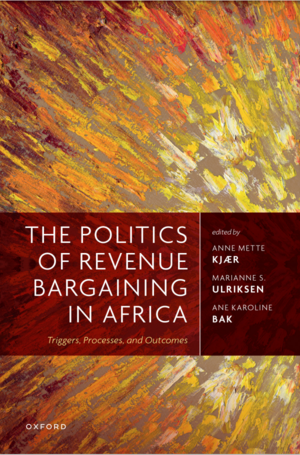Political Settlements and
Revenue Bargains in Africa
We know little of how citizens respond to increased taxation. Do they protest, do they demand services in return for the tax, or do they accept increased tax burdens?
This research programme has studied a series of micro-level revenue bargaining processes. On this basis, our research has widened/deepened our theoretical and empirical knowledge about revenue bargaining processes in lowincome countries with a view to identifying both what triggered the bargaining processes, how the processes evolved and whether they resulted in a sort of contract or agreement between the parties. Theoretically, we have developed and applied a framework inspired by fiscal sociology, which has focused the role of revenue mobilization in state-building processes, combined with political settlement theory, which has a more explicit and applicable focus on relations of power.
New book
The Politics of Revenue Bargaining in Africa - Triggers, Processes, and Outcomes
Edited by Anne Mette Kjær, Marianne S. Ulriksen, and Ane Karoline Bak
- Presents in-depth qualitative studies of policy bargaining processes
- Outlines a theoretical framework that takes into account both state-society relations and bargaining power
- Feature studies of policymaking in semi-democractic contexts
Reviews
"Tax collection and domestic revenue mobilization is on the rise in many African countries. What can we learn about shifting state-society relations and state accountability? This agenda-setting work examines a diverse range of “revenue bargaining” situations involving government and actors of varying political and economic clout—from domestic business lobby groups, farmers and trader associations, other societal groups, aid agencies, and MNCs—across five African countries. Resistance to taxation, tax concessions, new taxes broad and narrow, and “fiscal contracting” that can enhance accountability and broad-based development outcomes all provide grist for the authors’ empirically-rich, theoretically-informed analysis."
CATHERINE BOONE, Professor of Comparative Politics, Departments of Government
and International Development, London School of Economics
"When do African taxpayers flex their political muscles? Why do they choose to do it collectively, or individually? Can they buy more influence by paying taxes or funding election campaigns? This volume explores these and a dozen related questions across five countries, from local to national level. It opens doors and windows for policymakers and researchers alike."
MICK MOORE, Senior Fellow, International Centre for Tax and Development and Professorial Fellow,
Institute of Development Studies, University of Sussex
"This book makes an important contribution to our understanding of the politics of taxation in developing countries. Using a novel framework, drawing from the fiscal contracts and political settlements literature, the book studies the politics of revenue bargaining in Sub-Saharan Africa and shows how and under what conditions microlevel fiscal contracts may emerge. A must-read for scholars in development studies, economics, political science, and sociology, and for practitioners."
KUNAL SEN, Director, UNU-WIDER
"The increased discussions about the importance of revenue mobilization in Africa are often accompanied with discussions about the fiscal contract. But we have little empirical research about the processes that lead to these contracts; and even less evidence about when they fail. This book takes a few steps back to analyse the evolution of revenue bargains, from the triggers to the outcomes. While it is tempting to think of revenue mobilization as a structured and well-orchestrated process, the book provides several reminders of the messiness and granularity of the bargaining process."
JALIA KANGAVE, Independent Tax Researcher and Associate Research Fellow at the ICTD
